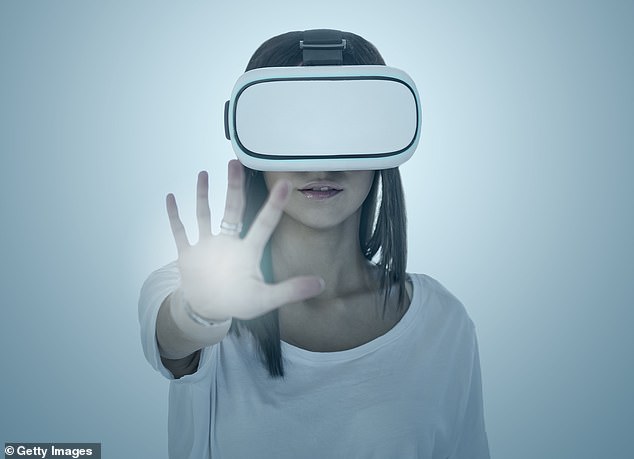It's the deadly eating disorder that's notoriously difficult to treat. A third of anorexics – characterized by restrictive eating and dramatic weight loss – relapse within five years.
And it is on the rise, with a record 10,000 children and young people diagnosed between April and December last year, almost two-thirds more than before the pandemic.
While talking therapies like cognitive behavioral therapy (CBT) can help patients cope with food anxiety, doctors often fail to get patients over a basic hurdle - eating enough to gain weight.
The longer anorexia patients avoid eating certain foods, often out of fear, the stronger the brain's association becomes between the food and the onset of the fight-or-flight response.

It's the deadly eating disorder that's notoriously difficult to treat. A third of anorexics - characterized by restrictive eating and dramatic weight loss - relapse within five years (stock photo)

Psychologists are testing virtual reality (VR) in a fascinating form of therapy to familiarize patients with foods that scare them. The Mail on Sunday has been given an exclusive first look at a VR game being tested on 180 anorexia sufferers
Now researchers at the disease's center of excellence, Maudsley Hospital in south-east London, may have found a solution.
Psychologists are testing virtual reality (VR) in a fascinating form of therapy to familiarize patients with foods that scare them.
The players wear a headset that transports them to a computerized 3D universe.
Images are transmitted to a screen inside the headset, making it appear as if the player is in a completely different world.
The Mail on Sunday got an exclusive first look at a VR game being tested on 180 anorexia sufferers and spoke to some of the participants.
The treatment is currently being trialled, but the researchers behind it are planning a version that will become standard treatment for NHS patients within the next three to five years.
Similar studies have shown that the games, when combined with psychological therapies such as CBT, can reduce body dysmorphia - where patients overestimate their height - by 40 percent.
Other studies have found that just six sessions are more effective in reducing binge eating in the long term than CBT.
The study includes patients already receiving traditional treatments, including sessions with a nutritionist, psychological therapy and input from a psychiatrist who can prescribe medication.

Researchers at the Anorexia Center of Excellence, Maudsley Hospital in south-east London (pictured), believe they may have developed a new treatment for anorexia
You then play the four-minute game under the supervision of a psychologist.
Once they wear the headset and headphones, patients enter a virtual kitchen, complete with a refrigerator and a countertop lined with foods like pizzas and Ben & Jerry's ice cream.
Patients maneuver their character around the kitchen and can choose foods to pick up and “eat.”
The treatment is thought to work like exposure therapy, often used to overcome phobias and obsessive-compulsive disorder, in which patients are gradually introduced to an experience or thing they are afraid of, such as spiders or dogs, reducing the fear over time.
“The brains of people with eating disorders develop pathways that mean food is associated with negative emotions,” says Dr. Valentina Cardi, a clinical psychologist specializing in eating disorders at King's College London and co-investigator of the study.
"The challenge is to build positive associations. When patients are repeatedly exposed to food in a virtual world, none of their fears, such as weight gain, are realized. Once they learn this, the fear should decrease. We hope that over time, eating will become much easier."
Eventually, the virtual kitchens will be designed to resemble those in patients' homes, and other environments such as restaurants and friends' homes will be made available.
“Studies show that exposure therapy is most effective when repeated many times in different settings,” says Dr. Cardi.
"All but two patients we've tested so far said it was valuable. It's still early, but patients should end up feeling less anxious after using the virtual reality game multiple times."
Stuart Kentish, 26, from south London, says VR has proven more effective than any other treatment he has tried.
The IT worker was diagnosed with anorexia in 2016 after he developed an extreme exercise habit and began restricting his diet.
"I would have one main meal a day and two very small ones for breakfast and dinner. It wasn't enough to feed a young man my size," says Stuart, who is 5ft 9in.
His weight loss increased rapidly and he soon felt so unwell that he was admitted to hospital for inpatient treatment, where he remained for six months.
He was then enrolled in an NHS daycare program which included group therapy and eating meals while receiving support from experts.
However, nothing helped combat his deep-rooted fear of food or help him gain weight. But last month he was invited to try out VR at the Maudsley Trial.
“I had never done anything like this before – it was very practical,” says Stuart. "This is exactly what I need to overcome the fear of food. Sometimes I talk about eating things I'm afraid of, but the restrictive behavior sets in quickly and stops me."
The game helped him confront an eating phobia that he never conquered.
"I was very nervous about the pasta plate," he says, "but I felt comfortable picking it up in the virtual kitchen. I quickly realized that what I was afraid of wasn't happening.
“It showed me that it was just a plate of pasta and the peace of mind that it was safe.”
The following month, Stuart ate a real plate of pasta for the first time in a year and a half.
“I don’t know why, but seeing it in the game gave me the confidence to really try,” he says. “And I quickly realized that my expectation was worse than the reality.”

 Suche
Suche
 Mein Konto
Mein Konto

